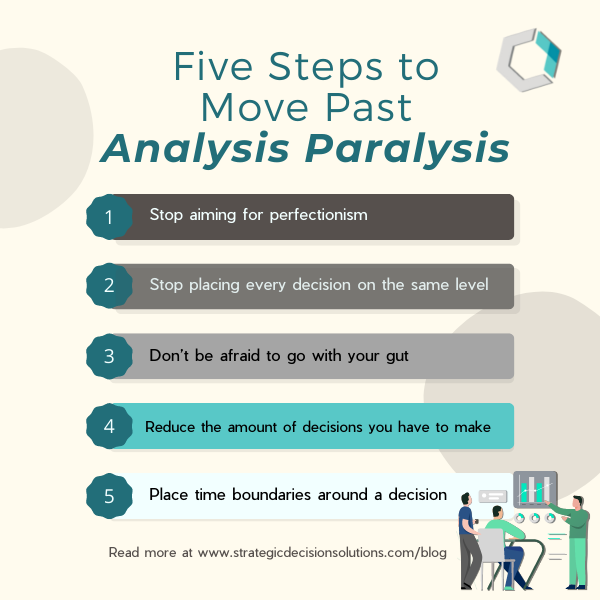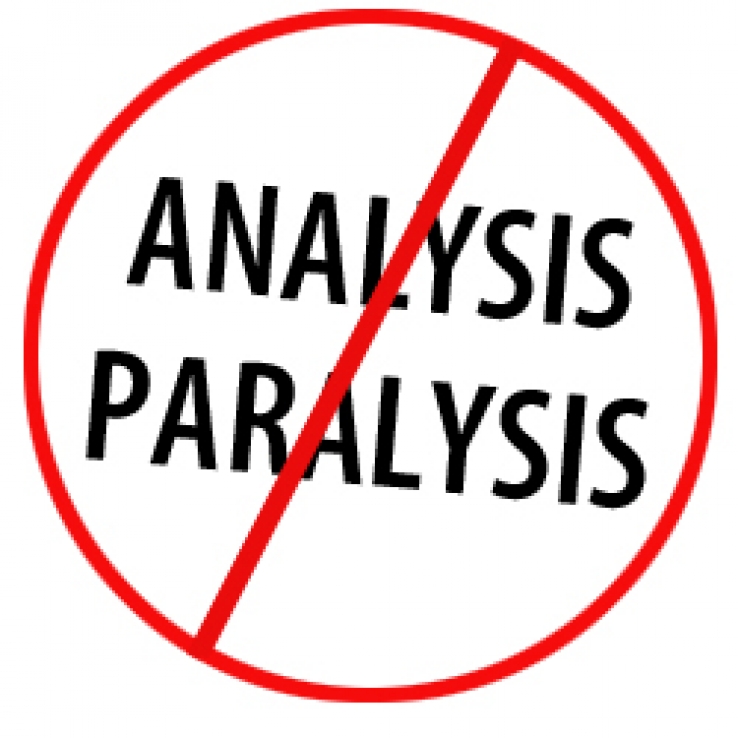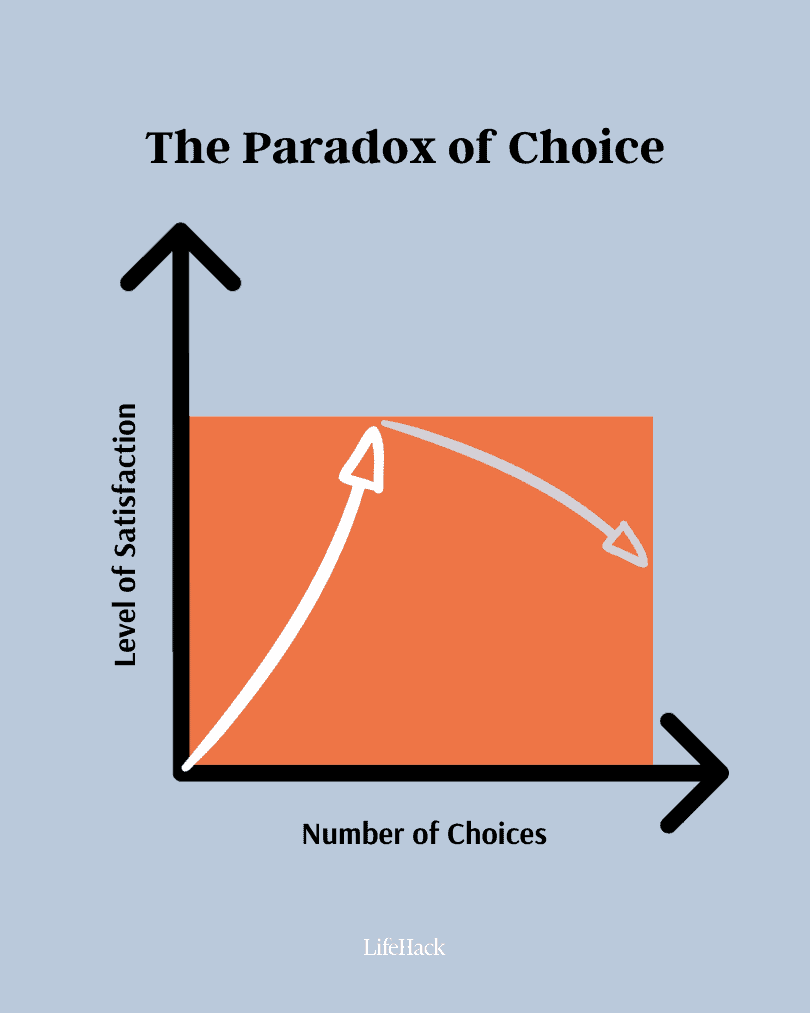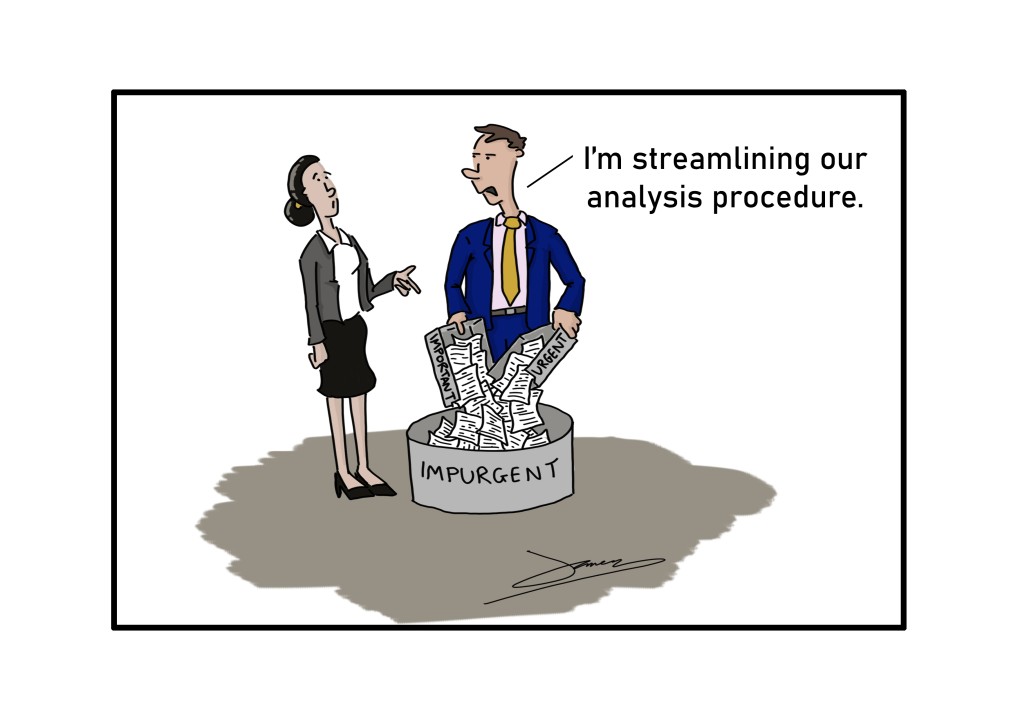Analysis Paralysis: What is It? And How You Can Overcome It. - Rethink the Rat Race
Por um escritor misterioso
Last updated 10 novembro 2024

This post may contain affiliate links which means we may receive a commission if you purchase through our links. For more information check out our Privacy Policy.Do you ever find yourself weighing all the options of a decision? Do you envision every possible outcome? At that point do you commit to a resolution, or do you continue this vicious cycle of constant analysis and never make a decision? If this sounds familiar, you may have ‘analysis paralysis’. According to the reliable source of Wikipedia, analysis paralysis is: is the state of over-analyzing a situation so that a decision or action is never taken, in effect paralyzing the outcome. I, like most people in the world, am guilty of this. I like to try to find the perfect solution to most any problem. This isn’t a huge issue for most decisions. I mean, who really cares what you eat that night, or if you should get these headphones off vs those other headphones. But when it comes to financial decisions that impact your future people tend to analyze it to death and never pull the trigger on investing because of the fear that they may be picking the wrong choice. If the goal is early retirement, there’s no room for months or years of constant second guessing or over analysis. There was a comment on my first blog post by Josh and it said: Great read James. Making sure the savings actually get invested is a big stumbling block in todays culture. Retirements dont just happen by themselves. You need big actions, like you did, to even consider an early retirement. Looking forward to your next article. This is a great comment, and he brings up some really thought provoking points. It really resonated with me because he is describing me perfectly about a year ago. I had just stumbled upon the concept of early retirement and had decided that I needed to begin investing ASAP. I was looking at choosing between Roth IRA vs Traditional IRA. I had read all about them and knew practically all the intricate details and tax benefits of either one. But, the more information I armed myself with, it just made the decision harder to make. All the while, I wasn’t actually investing. The money was sitting in my bank account and inflation was making it worth less day in and day out. I’ve not only done this with IRA accounts, but I’ve done it with rental properties as well. If you are an indecisive person and can’t even choose between a Traditional IRA or a Roth IRA, you really have no business looking at rental properties. I don’t know what possessed me to take on this level of anxiety of weighing out a million minute details. This neighborhood vs that neighborhood. This kitchen vs that kitchen. The gentrification process in this neighborhood vs the consistency in that neighborhood. The potential rental to mortgage ratio of this property compared to that property. I was driving myself crazy. And more importantly, all the good deals were getting snatched up. Every good property that I spent hours analyzing and never going to look at would be gone in a week and I’d have to move on to the next one to assess. At this rate I wouldn’t have a dollar in real estate or IRA’s before I was 40, which is a real problem for someone planning to retire by 30. Luckily, I finally started making decisions, and while all of them haven’t been perfect, they’ve all been progress. It was liberating, and with every decision I made, the others came easier and easier. It was like a light switch went off in my head. So here are a few things to think about, and some actionable tips that will hopefully get you off the sidelines and into the game. Commit to a timeline. Set dates, or even times that you need to make a decision by. To steal one of my own examples: if you are wanting to open an IRA, decide that you will open one on Friday, and you have from now until then to look at the pro’s and con’s but you are dedicated to making a decision that day. Understand that the data is only useful if it helps you come to a conclusion. Analyzing data just for the sake of dissecting it isn’t a beneficial use of your time. Also, don’t seek out more data than is necessary. No matter how much information you think you have, there will always be more. Find practical and functional resources that apply to your goals. Perfection isn’t mandatory, progress is sufficient. I touched on this earlier, but let’s say you are looking for the perfect rental property. This one is on the wrong street, that one is in the wrong town, this one has a small yard. I settled for the first one on the wrong street and I’m renting it out for a negligible amount less than you are looking for. You wait 2 years and finally find the perfect rental property. I’ve been making $600/month after expenses, but you are now making $650/month after expenses. In 5 years of owning my property, I’ve pocketed $36k, but in the same time period you’ve only owned yours for 3 years, and you are just now at $23k. I’ve had more investment income, so I’ve purchased another property and you’re just starting to look for another perfect property. The vicious cycle continues. Use automated systems when you can. It’s possible to take the decision making process out of many tasks. Timing the market is a perfect illustration of the antithesis of this. You’ve got a couple thousand dollars saved up that you are about to invest in your IRA. But, the markets are high today. You look at the news and watch Mad Money on CNBC and you decide the markets will be lower next week, so you’ll wait. But they didn’t drop like you thought, they’ve actually climbed up. Well, you can’t cut your losses now, you’ve got to wait till it drops to plunge this money into the market. If you had setup automatic contributions, you can contribute $211 a week and have your IRA maxed out halfway through the year. Then you get the benefit of time, compounding interest, and dollar cost averaging (buying weekly, you’ll get the highs, and lows, and the average will work itself out helping to hedge the perceived volatility of the market) working for you for the rest of the year. Make smaller practical steps toward a larger end goal, and celebrate small wins. To stay on the same vein of an IRA, committing to maxing out an IRA at the beginning of the year might be a daunting decision for some. For many people $5,500 isn’t a small amount of money to relinquish at once, even if it’s still yours in the account. But, by making weekly or bi-weekly contributions, you can take smaller steps toward meeting your goal of maxing out your retirement accounts. Acknowledge that some complicated choices aren’t worth it when there are simpler options that perform as well or even better. Stocks are a prime example of this. The constant research and complicated nature of buying and selling stocks of individual companies is a barrier of entry for many people interested in investing for their retirement. Luckily, low cost index funds like Vanguard’s VTSAX (Total Stock Market Index Fund) are not only easy to buy because by purchasing one share, you are purchasing a small fraction of every company traded on the US stock market, but it also has a higher history of performance, and much lower fees compared to actively managed funds. Sure, you can invest in blue chip stocks like Apple, Google, and Disney. But what happens when their CEO gets fired because of a scandal? Or some other company comes along and disrupts the entire market. In 2007, Yahoo! was the tech company to invest in, and Google barely existed, now the market is flipped and Google is seen as an empire and Yahoo! barely exists. Even two months ago, had you bought Whole Foods stocks, people would’ve laughed at you. Their stock prices peaked in Oct. 2013 at $65.24/share. By Oct. 2016 they had dropped over 50% to $28.89/share. The only guarantee with stocks is the uncertainty of individual companies. Whew, my fingers almost cramped up while typing that. If you made it through this novel, I appreciate your dedication. This is something that is very easy for me to write at great length about because of how many times it plagued me in the past. If you also suffer from Analysis Paralysis, or even if you don’t, I hope that you will utilize some, or all, of these tips. Maybe some points can help change your decision making process and make it an efficient and productive method used for your benefit.

The Leading Blog: A Leadership Blog

The Simplicity Principle Summary of Key Ideas and Review

The #1 Way To Overcome Analysis Paralysis!

The Gentle Art of Crushing It!

Analysis Paralysis: What is It? And How You Can Overcome It. - Rethink the Rat Race

3 Success Principles I Wish I Had Known At 20 (Part I), by Sarah Vo

Addy Osmani على LinkedIn: #javascript #webdevelopment #softwareengineering

Older Posts - ItsALearningLife

What are some ways to escape the rat race by starting a business? What business would you start? - Quora
Recomendado para você
-
 Analysis Paralysis (2018) - IMDb10 novembro 2024
Analysis Paralysis (2018) - IMDb10 novembro 2024 -
10 signs that you may have Analysis Paralysis10 novembro 2024
-
 How to Save Your Project from Analysis Paralysis10 novembro 2024
How to Save Your Project from Analysis Paralysis10 novembro 2024 -
 How to Move Past “Analysis Paralysis” – 5 Steps for Leaders - Strategic Decision Solutions10 novembro 2024
How to Move Past “Analysis Paralysis” – 5 Steps for Leaders - Strategic Decision Solutions10 novembro 2024 -
 iTWire - Release yourself from analysis paralysis10 novembro 2024
iTWire - Release yourself from analysis paralysis10 novembro 2024 -
 Paralysis by Analysis - TV Tropes10 novembro 2024
Paralysis by Analysis - TV Tropes10 novembro 2024 -
 Analysis Paralysis - Stop slowing down your enterprise! - Made Tech10 novembro 2024
Analysis Paralysis - Stop slowing down your enterprise! - Made Tech10 novembro 2024 -
 What is analysis paralysis and how to overcome it10 novembro 2024
What is analysis paralysis and how to overcome it10 novembro 2024 -
What is Analysis Paralysis?10 novembro 2024
-
 How to Overcome Analysis Paralysis: 4 Effective Strategies - LifeHack10 novembro 2024
How to Overcome Analysis Paralysis: 4 Effective Strategies - LifeHack10 novembro 2024
você pode gostar
-
 Pixilart - Sans AUs by SprUnder03110 novembro 2024
Pixilart - Sans AUs by SprUnder03110 novembro 2024 -
 Alien, Stands Awakening Wiki10 novembro 2024
Alien, Stands Awakening Wiki10 novembro 2024 -
 Revestimento de pedra natural: ideias incríveis para se inspirar!10 novembro 2024
Revestimento de pedra natural: ideias incríveis para se inspirar!10 novembro 2024 -
quando vai lançar boruto 3 na netflix|Pesquisa do TikTok10 novembro 2024
-
 Game Map Images - Free Download on Freepik10 novembro 2024
Game Map Images - Free Download on Freepik10 novembro 2024 -
 MAIA RESIDENTS - Prices & Condominium Reviews (Parnu, Estonia)10 novembro 2024
MAIA RESIDENTS - Prices & Condominium Reviews (Parnu, Estonia)10 novembro 2024 -
 Tottenham Hotspur Football Club10 novembro 2024
Tottenham Hotspur Football Club10 novembro 2024 -
 Naruto PNG Images, Vetores E Arquivos PSD10 novembro 2024
Naruto PNG Images, Vetores E Arquivos PSD10 novembro 2024 -
NETFLIX ( Os melhores)10 novembro 2024
-
 Download World Cricket Championship 3 on PC with MEmu10 novembro 2024
Download World Cricket Championship 3 on PC with MEmu10 novembro 2024


